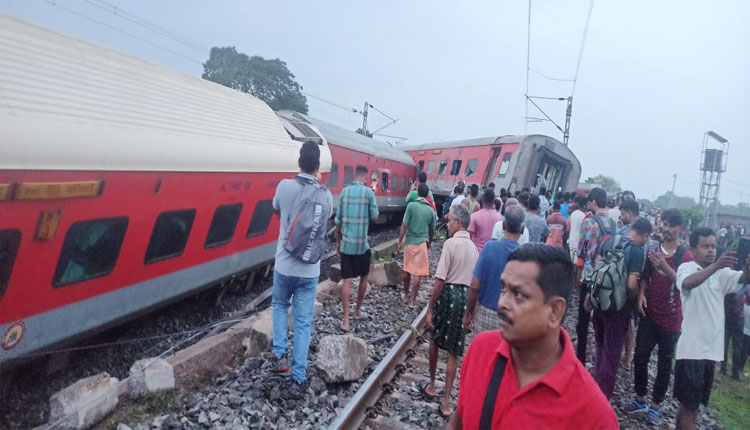New Delhi: A recent spate of train accidents has raised serious concerns about rail safety in India. In the past 13 days, the country has witnessed eight rail mishaps, resulting in tragic loss of life and numerous injuries. These incidents have put a spotlight on the safety and reliability of the Indian Railways, prompting widespread public and political discourse.
The most recent incident occurred today in Jharkhand’s Chakradharpur, where a passenger train travelling from Howrah to Mumbai derailed, causing 18 coaches to come off the tracks. Tragically, three passengers lost their lives and over 40 were injured. Preliminary investigations revealed that the derailment was caused by a plastic cover from a stationary goods train, which blew onto the train’s engine due to strong winds, obscuring the loco pilot’s view and leading to an emergency brake application.
This accident is part of a worrying trend, as highlighted by a “calendar of rail accidents” released by the Congress Party. The list details incidents from July 18 to July 30, including:
– **July 18**: Chandigarh-Dibrugarh train accident, resulting in 4 deaths and 31 injuries.
– **July 19**: Derailment of a goods train in Valsad, Gujarat.
– **July 20**: Derailment of 12 coaches of a goods train in Amroha, Uttar Pradesh.
– **July 21**: Derailment of 3 coaches of a goods train in Alwar, Rajasthan, and another in Ranaghat, West Bengal.
– **July 26**: Derailment of a goods train in Bhubaneswar, Odisha.
– **July 29**: Separation of coaches in the Bihar Sampark Kranti Express in Samastipur, Bihar.
These incidents have sparked debate in Parliament, with opposition leaders criticising the government’s handling of railway safety. Samajwadi Party President Akhilesh Yadav accused the government of prioritising record-setting over safety, while RJD leader Lalu Yadav described the coaches as “moving coffins.”
The Public Accounts Committee of Parliament has also expressed concern, presenting a 71-page report detailing 1,129 cases of train accidents. The report attributes 395 accidents to trains derailing, with 173 incidents linked to operational failures, including inadequate maintenance and driver errors.
The Indian Railways has been advocating for the implementation of the Kavach system, an advanced safety mechanism designed to prevent collisions. However, the system currently covers only 2 % of the rail network. The government has allocated Rs 1,112 crore for Kavach in the 2024-25 budget, but experts estimate that full implementation across all routes would require at least Rs 45,000 crore.
Adding to the safety concerns is the significant number of vacancies in critical safety positions within the Railways. According to an RTI response earlier this year, approximately 1.5 lakh positions related to safety—such as track maintainers, pointsmen, and signal supervisors—remain unfilled.
As India grapples with these safety challenges, passengers and policymakers alike are demanding urgent action. The repeated incidents have not only eroded public confidence in the railway system but have also highlighted the urgent need for comprehensive reforms and investment in safety infrastructure. The question remains: with a constrained budget and significant staffing gaps, how will the Indian Railways ensure the safe journey it promises to millions of passengers each day?



Comments are closed.